By:
- Anthony King
Published Date
By:
- Anthony King
Share This:
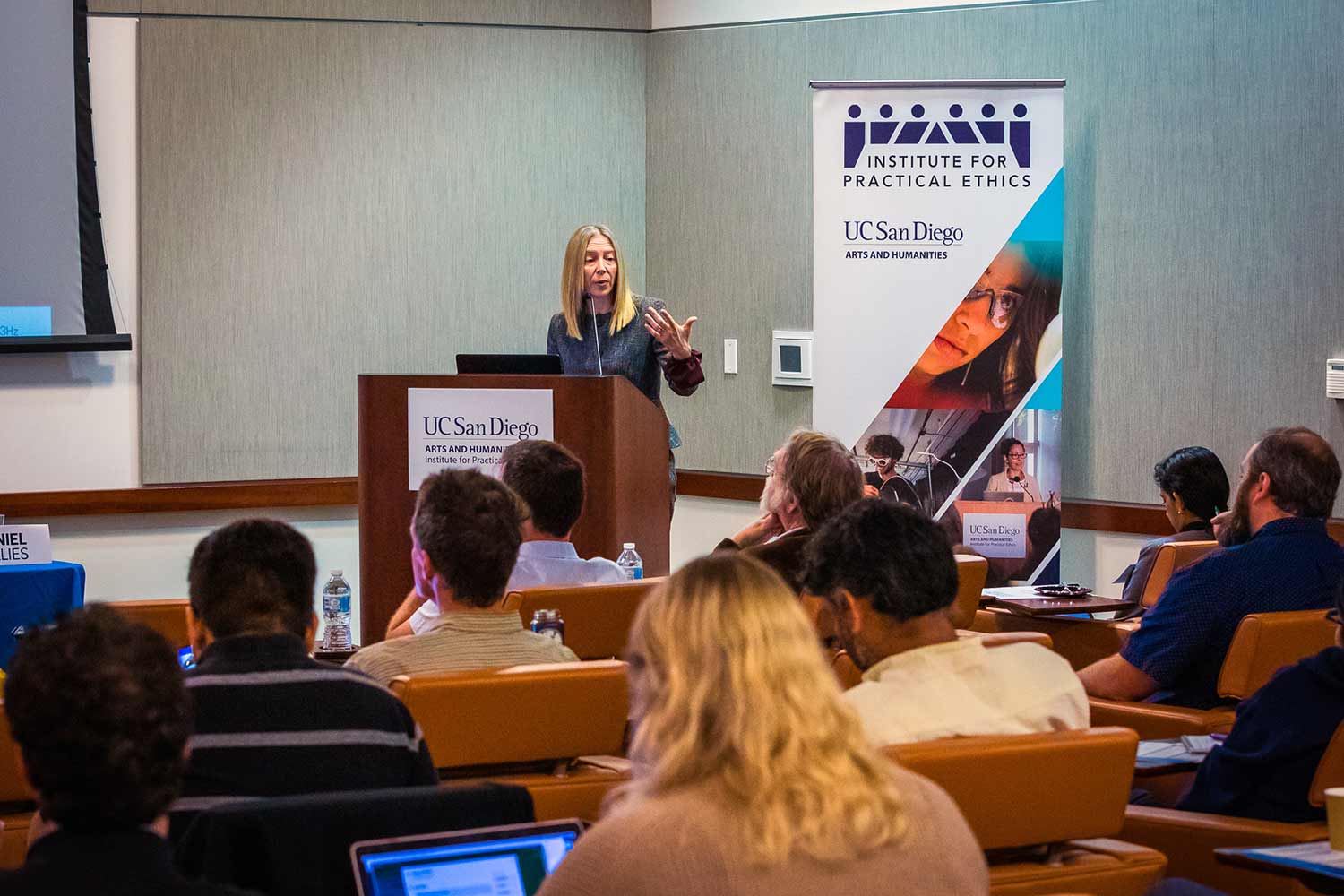
Department of Psychiatry associate professor Cinnamon Bloss presented her research “Genetic Engineering in the Golden State” during the inaugural conference. Photos by Patrick Hennessey/UC San Diego Division of Arts and Humanities.
Understanding the Ethics of Genetic Engineering
UC San Diego’s Institute for Practical Ethics hosts inaugural conference on the impact of gene drive technology
The UC San Diego Institute for Practical Ethics hosted its inaugural conference on the ethics and social implications of gene drives, bringing together leading scientists and ethicists working toward a better understanding of what happens when—not if—genetic engineering becomes increasingly commonplace.
In what will become an annual conference, the overarching aim is to develop and promote research on ethical issues facing the public in regards to genetic engineering technology, with a special emphasis on fostering deliberation between ethicists, scientists and policymakers: a key component of the institute’s mission.
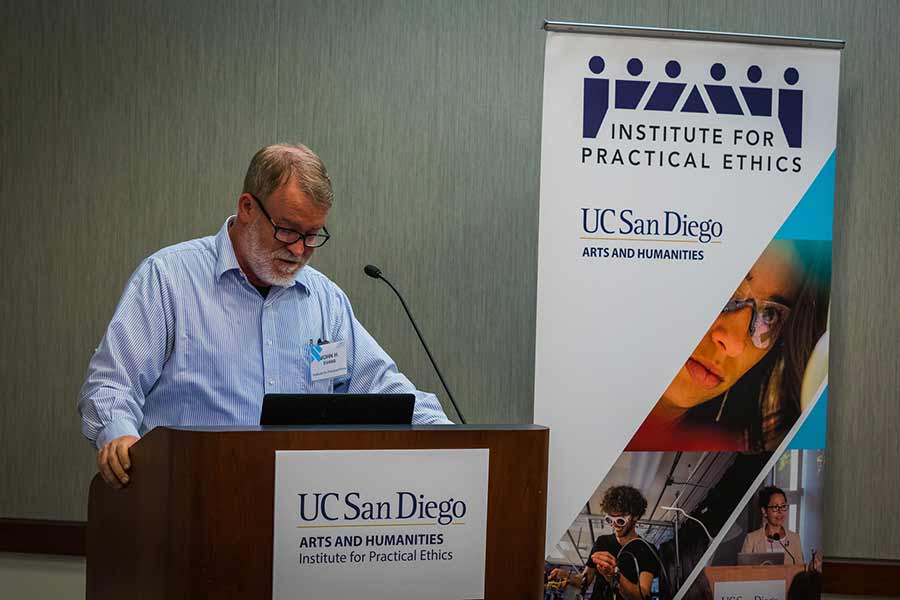
John H. Evans, co-director of the Institute for Practical Ethics and Tata Chancellor’s Chair in Social Sciences.
“All around us, scientists are discovering new facts about the natural world with the ultimate aim of human betterment, but how will we know which of these new technologies will actually result in bettering our lives? We cannot get that information from science itself, and have to look to society,” said John H. Evans, co-director of the Institute for Practical Ethics and Tata Chancellor’s Chair in Social Sciences.
Evans leads the interdisciplinary institute with Department of Philosophy professor Craig Callender, who said UC San Diego was quickly becoming a global center for gene drive technology as well as the social debates surrounding their use. The May 9-10 conference was held with the university’s Tata Institute for Genetics and Society, a partnership between UC San Diego, the India-based philanthropic Tata Trusts and the Institute for Stem Cell Biology and Regenerative Medicine in Bangalore, India.
“Thanks to the foresight of the people of Tata and the leaders in the Division of Biological Sciences, we’ve simultaneously created a discussion about the social implications and ethics of this technology,” Evans said. “Our goal is to facilitate the debate about gene drive applications more generally, and we feel there needs to be an independent debate about all of the efforts of this technology around the world.”
The two-day conference began Thursday with a public presentation and discussion led by Ronald Sandler, chair of Northeastern University’s Department of Philosophy and Religion and director of their Ethics Institute. Sandler focused on the use of gene drives as a means to pursue environmental conservation.
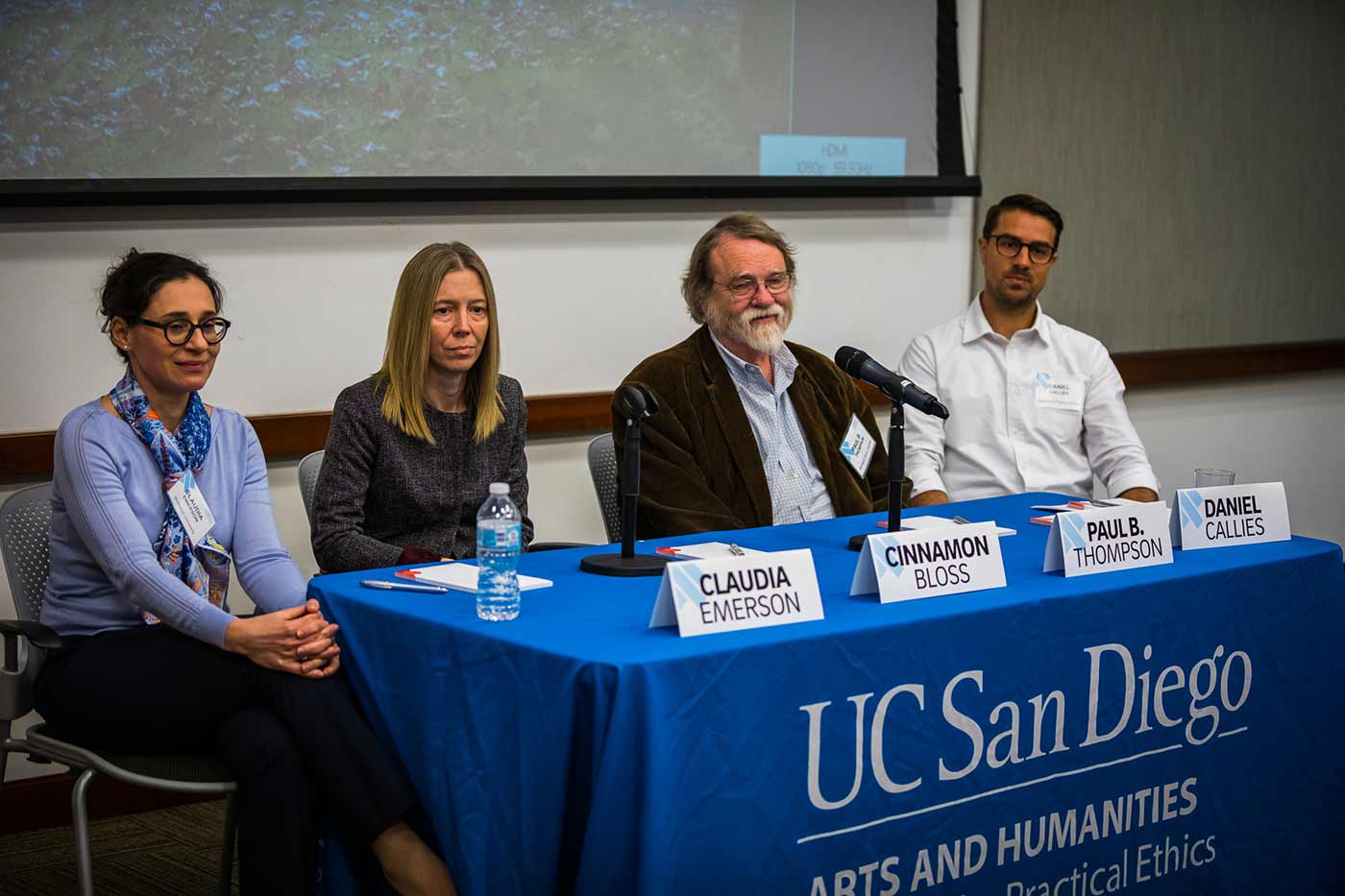
Participating researchers presented over three panels May 10, with discussion following each.
“[Gene-editing techniques] are much more powerful than prior technologies, in the sense of increasing the range of ways and ease with which humans can intentionally modify the biological world at the genomic level. What is not developing nearly so fast is the capacity to analyze and evaluate the significance of adopting these technologies in conservation contexts,” Sandler said, acknowledging that it was exciting to share these ideas with leading genetic ethicists from across the country.
In conservation efforts, Sandler said technology including gene editing via CRISPR, assisted reproduction, synthetic biology and genomics, and gene drives have many applications: cloning, genetic rescue, de-extinction, invasive pest elimination, assisted adaptation and engineered disease resistance, among others.
Sandler’s talk led to much discussion from the community, as he provided the grounds for identifying a full range of ethical issues associated with new conservation possibilities that genetic engineering provide. The point was not to endorse nor oppose these technologies, he said, but rather to show how “thoughtfulness and carefulness is warranted” in the discussion.
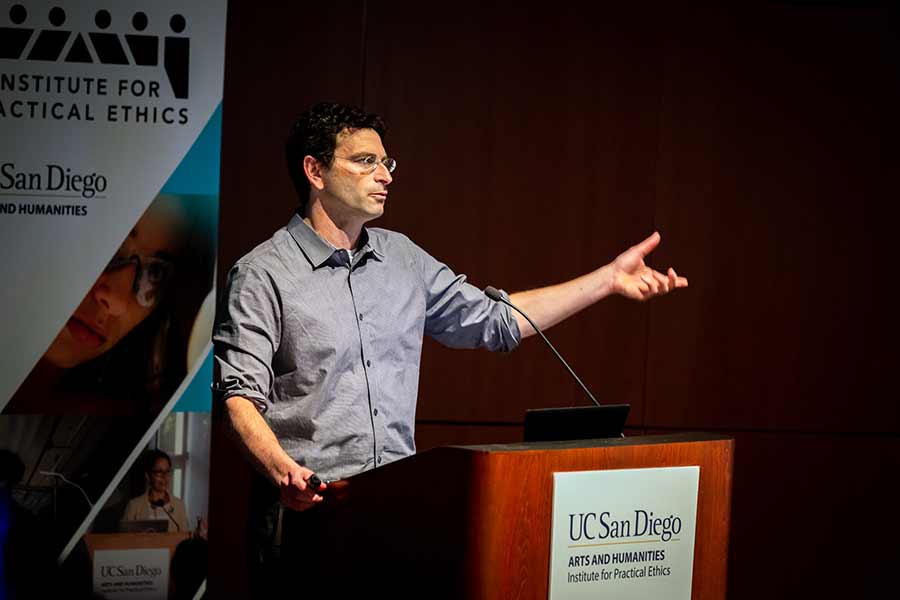
Ronald Sandler of Northeastern University gave the conference plenary address.
Ten researchers presented components of their work the following day, followed by three panel discussions with invited attendees. Institute for Practical Ethics research scientist Ramya Rajagopalan gave an overview to her continued work on gene drives, values and ethics, while post-doctoral scholars Daniel Callies and Amy Zhou presented their research on prioritizing biotechnology, and understanding risk between three stakeholders in gene-drive technology, respectively.
In addition to Rajagopalan, Callies and Zhou, the institute hosts multiple visiting scholars and currently has two Ph.D. fellows: Hailey Kwon, a graduate student in the Department of Philosophy, and Riley Taitingfong in the Department of Communication.
“Not only are we growing and developing the field of ethics in gene drives, but we’re building a very lively community of researchers looking at emerging tools in medicine and global health, climate change and conservation, big data and human enhancement,” Callender said.
Additionally, the institute supports academic research through a number of seed grants, funding projects that explore where hard science and ethics meet. In conjunction with the UC San Diego Halicioğlu Data Science Institute and Division of Social Sciences, the Ethics and Policy Implications of Algorithms and Big Data conference was held in February.
The Division of Arts and Humanities addresses important issues surrounding emerging progress in medical discoveries, scientific research and technological innovations through the Institute for Practical Ethics, a signature initiative of the division. Formed as an interdisciplinary research unit within UC San Diego in 2017, it is dedicated to the goal of creating socially responsible science and policy.
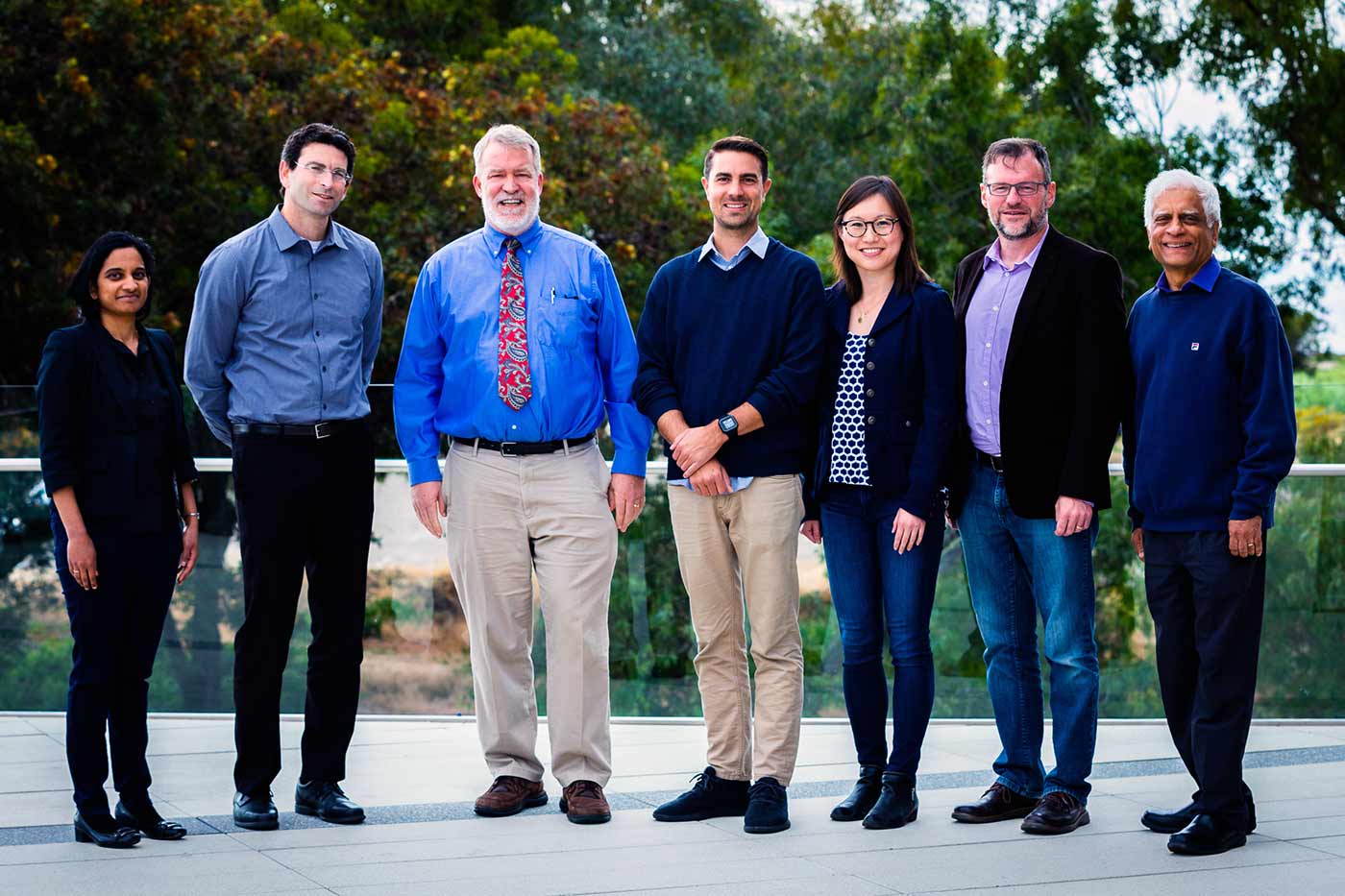
From left, Ramya Rajagopalan, Ronald Sandler, John H. Evans, Daniel Callies, Amy Zhou, Craig Callender and Suresh Subramani, Global Director of the Tata Institute for Genetics and Society, on May 9.
One of the world’s greatest producers of cutting-edge, scientific knowledge, the institute allows UC San Diego to have ethicists and social scientists working “hand-in-hand” with biologists, medical researchers and engineers, training each other in their respective fields to genuinely discover the best path forward by considering all impacts.
“The vision of the institute is to engage in a holistic analysis of the social implications and ethics of science, technology and medicine, and we have already built, I believe, one of the strongest cross-disciplinary institutes at the university,” said Evans, a Division of Social Sciences associate dean and professor in the Department of Sociology. “We are grateful to have many scientists, social scientists and philosophers from multiple divisions who are an active part of our mission.”
Share This:
You May Also Like
Stay in the Know
Keep up with all the latest from UC San Diego. Subscribe to the newsletter today.



